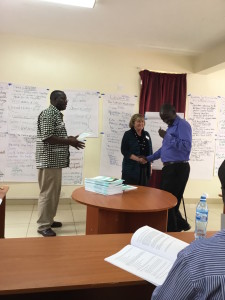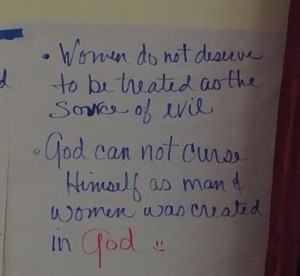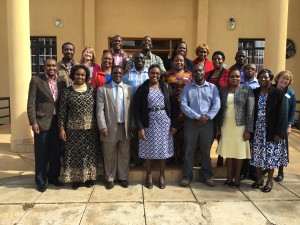So the Lord God said to the serpent, “Because you have done this,
“Cursed are you above all livestock
and all wild animals! (Gen. 3:14)
“Cursed is the ground because of you;
through painful toil you will eat food from it
all the days of your life. (Gen. 3:17)
What does it mean to be “cursed”? In Western culture, this word is rarely used in a serious manner. It might be a synonym for unlucky, or we might even use it as a verb: he cursed at me. We don’t take it very seriously. If someone curses at us, we consider them rude, but we don’t fear it will actually hurt us in any way other than perhaps offending us.
In many of the cultures where Empower is invited to teach, the word and idea of being cursed is far more serious, and far more powerful.
As Carrie has written in this article on the need for Empower: “people believe that ‘a curse’ will always come true. If a father tells his child, ‘You will never amount to anything,’ or someone hires a witchdoctor to curse a neighbor whom he envies or dislikes, everyone expects those cursed to sicken, lose their possessions, fail their exams, and otherwise fall apart.”
In these cultures, a misunderstanding of Genesis 3 leads to people teaching and believing that women are cursed. And therefore, any abusive treatment of them is justified. Their rights or feelings don’t matter. These attitudes can lead to abuse or neglect of women and girls. It can mean that if there are limited resources, the women and girls will be the last in line to get them. The consequences can be dire.
This week in Kenya, Carrie and Donnell taught the New Man, New Woman, New Life seminar at St. Paul’s University.

One of the most significant points in that teaching is when we dig into the text of Genesis 3 to discover that the woman was not cursed. Rather, the serpent and the ground were cursed. Not the woman, nor the man. To many people who attend New Man, New Woman, this is astonishing news.
Toward the end of the seminar, we ask for “report outs”—for participants to share what they’ve learned, by way of summary. These are listed on large pieces of paper put up on the classroom walls. As is almost always the case, the idea that the woman is not cursed is one of the biggest “ah-ha! moments” of the seminar.
 This photo of the “report outs” says it all—“women do not deserve to be treated as the source of evil.” The transformative power of our message is so clear—knowing women (and men) are not cursed, because they are made in God’s image, changes everything about their relationships. It changes how wives and daughters are treated.
This photo of the “report outs” says it all—“women do not deserve to be treated as the source of evil.” The transformative power of our message is so clear—knowing women (and men) are not cursed, because they are made in God’s image, changes everything about their relationships. It changes how wives and daughters are treated.
The second statement reflects a shift in theology, a deeper understanding of Scripture: God does not curse his own image. In a culture that deeply reveres the Bible, this is good news indeed, and an opportunity to reverse the plight of women. It offers opportunity for healing and unity, for families to be transformed.

The New Man, New Woman, New Life seminar is available as a Bible study guide under the title Face-to-Face. It’s available on amazon.
